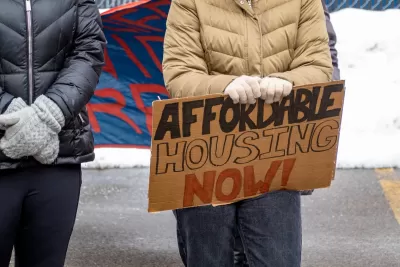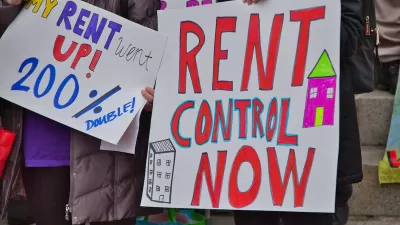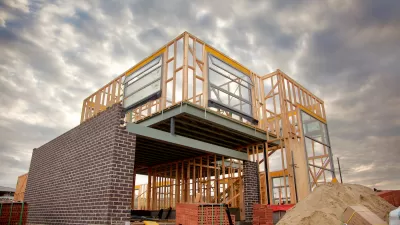An Urban Institute analysis outlines three ways federal lawmakers can support housing programs that provide permanent affordable housing for the households that need it most.

In a piece for the Urban Institute, Samantha Atherton and Samantha Fu highlight the importance of housing costs to most voters — and the lack of effective messaging around housing policy coming from political candidates seeking office this November.
According to the authors, “Permanently affordable housing, or housing that is insulated from the private, speculative market, is one solution to the housing crisis that both Democrats and Republicans favor.” Even a majority (60 percent) of Republicans reported they would support a candidate who has a plan for permanently affordable housing.
Expanding the nation’s stock of permanently affordable housing is one way to decommodify housing, or decouple access to housing from the ability to pay for it.
The authors outline three strategies that the federal government could undertake to create a supply of permanently affordable housing and alleviate the housing crisis growing across the nation.
The three policy proposals include creating a federal Green Social Housing Development Authority responsible for building and maintaining affordable housing units. “The authority would serve as a vehicle for the federal government to acquire distressed real estate, public land, investor-owned vacant properties, expiring low-income housing tax credit properties, and properties with track records of landlord exploitation and repair and retrofit them.” The properties could then be transferred to nonprofits, housing authorities, resident cooperatives, or local governments for long-term management.
Other suggestions include providing federal funding for state and local housing entities and building capacity for democratic community control of housing to further decommodify housing and empower residents to have decision-making power in their community. “The federal government could help build residents’ and communities’ capacities to engage in these models by providing technical assistance and funding initiatives to drive community engagement and organizing.”

Planetizen Federal Action Tracker
A weekly monitor of how Trump’s orders and actions are impacting planners and planning in America.

Congressman Proposes Bill to Rename DC Metro “Trump Train”
The Make Autorail Great Again Act would withhold federal funding to the system until the Washington Metropolitan Area Transit Authority (WMATA), rebrands as the Washington Metropolitan Authority for Greater Access (WMAGA).

The Simple Legislative Tool Transforming Vacant Downtowns
In California, Michigan and Georgia, an easy win is bringing dollars — and delight — back to city centers.

The States Losing Rural Delivery Rooms at an Alarming Pace
In some states, as few as 9% of rural hospitals still deliver babies. As a result, rising pre-term births, no adequate pre-term care and "harrowing" close calls are a growing reality.

The Small South Asian Republic Going all in on EVs
Thanks to one simple policy change less than five years ago, 65% of new cars in this Himalayan country are now electric.

DC Backpedals on Bike Lane Protection, Swaps Barriers for Paint
Citing aesthetic concerns, the city is removing the concrete barriers and flexposts that once separated Arizona Avenue cyclists from motor vehicles.
Urban Design for Planners 1: Software Tools
This six-course series explores essential urban design concepts using open source software and equips planners with the tools they need to participate fully in the urban design process.
Planning for Universal Design
Learn the tools for implementing Universal Design in planning regulations.
Smith Gee Studio
City of Charlotte
City of Camden Redevelopment Agency
City of Astoria
Transportation Research & Education Center (TREC) at Portland State University
US High Speed Rail Association
City of Camden Redevelopment Agency
Municipality of Princeton (NJ)





























